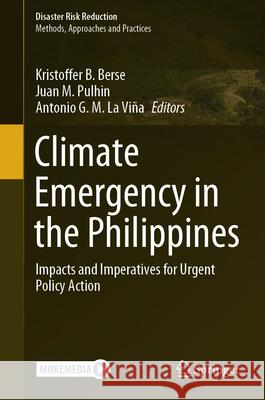Climate Emergency in the Philippines: Impacts and Imperatives for Urgent Policy Action » książka



Climate Emergency in the Philippines: Impacts and Imperatives for Urgent Policy Action
ISBN-13: 9789819978038 / Angielski
Climate Emergency in the Philippines: Impacts and Imperatives for Urgent Policy Action
ISBN-13: 9789819978038 / Angielski
(netto: 536,72 VAT: 5%)
Najniższa cena z 30 dni: 539,74
ok. 22 dni roboczych.
Darmowa dostawa!
Chapter 1: Climate Emergency in the Philippines: Sectoral Impacts, Local Experiences, and Multidisciplinary Responses
Kristoffer B. Berse, Juan M. Pulhin, Antonio G. M. La Viña and Micah M. Nazal
PART I: Sectoral Realities of Climate Emergency in the Philippines
Chapter 2: Climate Change Impacts on Coastal Communities
Laura T. David, Rhodora Azanza, Talna dela Cruz, Roselle Borja-del Rosario, Hannah Amihan, Ma. Simeona Martinez and Eileen Peñaflor
Chapter 3: Sea Level Rise and Coastal Erosion in the Philippines: Impacts and Adaptation Strategies for Coastal Communities
Fernando P. Siringan and Ma. Yvainne Sta. Maria
Chapter 4: Epidemics, Diseases, and Health Emergencies Arising From Climate Change and Natural Disasters in the Philippines
Jinky Leilanie Lu
Chapter 5: Climate Change and Food Security in the Philippines: Impacts, Adaptation and Climate Change Action
Maria Victoria Ortega-Espaldon and Celia dR. Medina
Chapter 6: Water Security in the Context of Global Climate Emergency
Alejandro N. Ciencia Jr., Lorelei C. Mendoza, Gladys A. Cruz and Rainier Ric de la Cruz
PART II: Local Experiences from Selected River Basin Ecosystems and Coastal Communities
Chapter 7: The Need for a Clear Rehabilitation Roadmap for Manila Bay Coastal Ecosystems: A Microcosm of Climate Emergency in the Philippine Context
Rene N. Rollon, Giannina Marie G. Albano, Green Ann A. Cruz, Maia Patricia D. Garcia, Kristine Camille V. Buenafe, Anisette Monique G. Albano and Betty May R. Villamayor
Chapter 8: Flood Hazard Mapping with Nonstationary Extreme Values under Changing Climate for Cagayan de Oro River Basin
Guillermo Q. Tabios III
Chapter 9: Climate Change Strategies in the Davao River Basin
Joseph E. Acosta and Dr. Ruth U. Gamboa
Chapter 10: The Post-Yolanda Relocation and Climate Emergency: The Case of Tacloban North
Ladylyn Lim Mangada
Chapter 11: Small Island Community Resilience: Building the Capacities of Isolated Communities to Address Climate Risks and Disasters
Jorge S. Ebay, Josephine T. Firmase, Darlene Joy D. Calsado, Lovella M. Magluyan and Marianito M. Ramirez, Jr.
Chapter 12: Coastal Areas: A Safe Zone for Shelter Purposes? A Case Study on the Municipality of Daanbantayan, Cebu as Basis for a Coastal Community Vulnerability Assessment and Adaptation Strategies
Liza D. Corro
PART III: Multidisciplinary Responses, Prospects and Challenges
Chapter 13: Fill in the Blanks: Data Voids in Philippine Hazard Maps
Jonnifer R. Sinogaya, Chito L. Patiño and Melanie Montaño
Chapter 14: Mainstreaming Climate and Disaster Risk Assessment for Comprehensive Land Use Planning
Alfredo Mahar Francisco A. Lagmay, Joy T. Santiago and Jerico E. Mendoza
Chapter 15: Financing in the Time of Climate Emergency
Erwin Gaspar A. Alampay and Dennis dela Torre
Chapter 16: Reframing Climate Change: An Ecocritical Frame
Flaudette May V. Datuin
Chapter 17: Using Creative Approaches in Communicating Risks to Populations Exposed to Natural Hazards
Leonardo C. Rosete and Aurora Odette Mendoza
Chapter 18: Tackling Climate Emergency Head-on: An Action Agenda for Policymakers
Antonio G. M. La Viña, Kristoffer B. Berse, Juan M. Pulhin, Alfredo Mahar Francisco A. Lagmay, and Kirsten Lianne Mae C. DedaseKristoffer B. Berse, Ph.D., is an associate professor and Dean at the University of the Philippines (Diliman) National College of Public Administration and Governance (NCPAG), and previously served as Director for Research and Creative Work of the University of the Philippines Resilience Institute.
Juan M. Pulhin, Ph.D., is a professor and former Dean at the University of the Philippines (Los Baños) College of Forestry and Natural Resources, and served as a lead author of the United Nations Intergovernmental Panel on Climate Change (IPCC).
Antonio Gabriel M. La Viña, Ph.D., is a professorial lecturer at the University of the Philippines (Diliman) College of Law and NCPAG, previously served as the Executive Director of the Manila Observatory and Dean of the Ateneo School of Government, Ateneo de Manila University, and was the lead negotiator for the Philippines in various international climate change issues.
This book provides a snapshot of the manifestations of the climate emergency in the Philippines from a wide array of disciplines including physical sciences, social sciences, arts and humanities, management, and law. Researchers and faculties at the University of the Philippines contributed to this compilation, where each chapter provides policymakers and the public a clear picture of why climate change must be confronted with a sense of urgency and near-desperation.
Divided into three main parts, the first one zeroes in on climate-vulnerable sectors such as water, food and agriculture, health, and coastal communities in the Philippines to introduce readers to the current pressing impacts of the climate emergency. The second part presents case studies of local experiences from the country’s three island regions, namely, Luzon, Visayas, and Mindanao, and it situates the readers in different environments and contexts. The third part features transdisciplinary responses to the climate emergency, including salient challenges in relation to planning, financing, communication, and education. The concluding chapter highlights eight areas for action to tackle the climate emergency. Each chapter comes with an overview and a Summary for Policymakers, which provides clear guidance for action to be taken by both local and national policymakers.
1997-2026 DolnySlask.com Agencja Internetowa
KrainaKsiazek.PL - Księgarnia Internetowa









